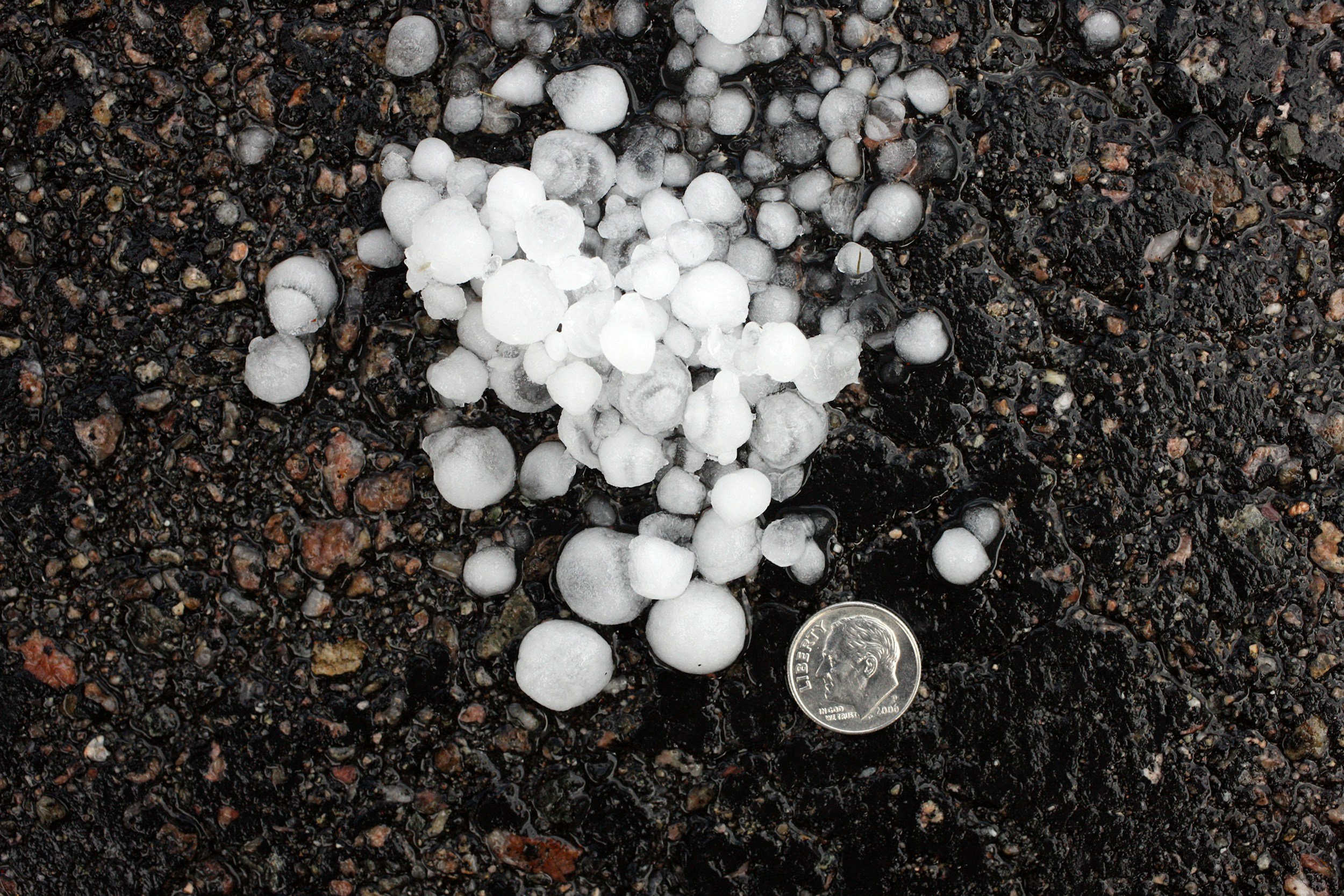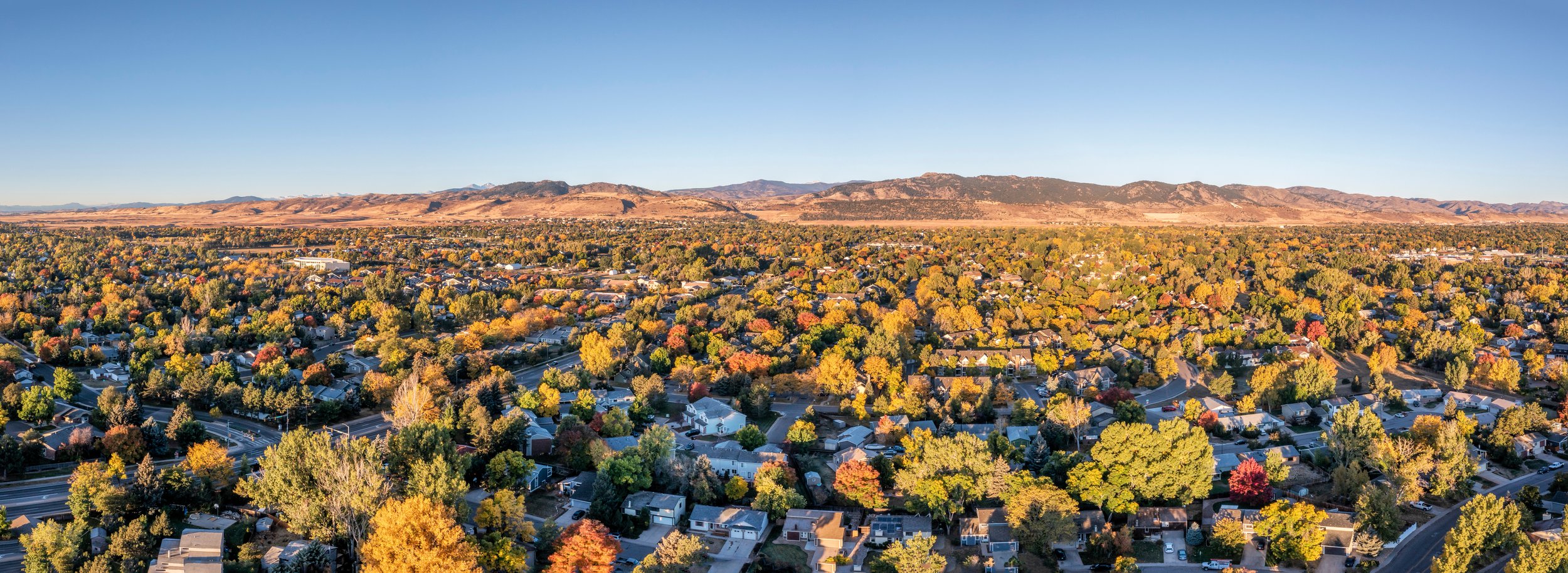
Signs of Storm Damage
Hail Alley – that is the nickname some have given to Colorado’s front range where the great plains of the American west rush into the Rocky Mountains. “Hail Alley” actually stretches from the state of Wyoming down to Texas and covers parts of Kansas, Nebraska, and Oklahoma. Some researchers may include areas of Illinois, Iowa, and Missouri. (link)
Thunderstorms are the main cause of trouble. Severe weather can create damaging hailstones that are over one–inch in diameter. Since Colorado is in hail alley we can usually expect 7-to–9 hailstorms a year. The type of hail that will damage your home (1.0 inch to 1.75+ inch in diameter) could slam into your roof at 25 to 40 MPH. (link)
FYI:
the biggest hailstone ever recorded in Colorado was 4.83 inches in diameter. It fell in Yuma County, Colorado on August 8, 2023.

Your roof shingles are the first place to look if you have storm damage. Hailstones can hit them hard enough to break the fiberglass mat that can lead to water leaks. Vulnerable spots like the ridge and hip could see hailstones punch right through the shingle and damage the underlayment. Hail impacts can look like bruises, circles, or just splotches of dark areas on your shingles where the granules have been knocked away. Note: if you have clay or concrete tiles on your roof, look for cracked tiles or bits of tile in your gutters.

The terrible winds generated by a thunderstorm or a microburst can be so strong it will rip your shingles right off the roof. Looking for missing shingles is an easy indicator you have storm damage. What is harder to see is if the windstorm failed to rip the shingle off the roof but still tore the shingle from its adhesive attachment to the roof. This requires a trained professional (like your friendly neighbor Valor rep) to perform an inspection and look for shingles that have lost their grip.

This one takes longer to show up (usually) but if your home suddenly sprouts a leak in the ceiling, lights, or walls then you probably have a damaged roof. Staining on your ceiling or a musty odor in the home or attic could be warning signs that you need your roof inspected.

We are back to roof shingles again. If you can’t get on your roof or don’t want to (we do not recommend homeowners getting on the roof) you can look in your gutters or where your downspouts drain out. Do you see a lot of excess granules? Granules give your roof their color and they are designed to protect your shingles from the sun’s harsh UV rays. If you see a lot of granules sitting in your gutters or getting washed out of your downspout you need a roof.

Damaging hail can be strong enough to dent your metal gutters and downspouts. Take a walk around your home and look at your downspouts. Can you see any dents? Or get a ladder and put your eye at the gutter level and look for dents. An easier way to check is look at the hood of your car. If your vehicle was in the driveway when the hailstorm hit, if you see dents on your vehicle then you definitely need to have your roof inspected.

Dents in a metal fascia can be easy to spot and identify hail damage. If you have painted wood trim around your home, you can look for spots where the hail has knocked the paint away. Often you’ll see this at the edge or corners of the fascia. Another spot to look is at the top of any wood railings (e.g., a wood railing or banister along your front porch), and you could see impact dents or damage to the stain or paint. You will also want to eyeball your siding. Depending on the type of siding you have, hail damage could show up as actual holes or hard-to-see dents, nicks, and scratches along the paint and edges.

Checking the trees and flowers in your yard is another easy way to notice your home was in a significant storm. While it is very common to see leaves and small branches littering the neighborhood after a storm, it is not a great indicator that you actually have any damage. The leaves and soft petals of your flowers are too fragile to withstand much damage, but they may be an early warning sign that you need to inspect your property for additional evidence.

Take a walk around your home and check the windows. Obviously, any cracked or broken window panes would be a dead giveaway if your home was hit with serious hail (or a fallen tree branch, or wind-driven debris). You should also look at the window screens, the window bead, and the window frame.
The window screens could be torn or stretched out of place. Next, check the window bead. This is the thin plastic molding that frames the part of the windows without any screen. These could be split, cracked, or have circular or half-moon-shaped holes in them. Finally, look at the window frame itself. If the frame is broken (i.e., has a crack or hole in it) then you’ll need to have that window replaced before it starts leaking.
Hail Size Chart
Examples of Storm Damage:

Valor’s Service Area
Golden
Greeley
Greenwood Village
Highlands Ranch
Indian Hills
Lakewood
Lafayette
Littleton
Lone Tree
Longmont
Louisville
Mead
Morrison
Niwot
Northglenn
Parker
Roxborough
Superior
Thornton
Westminster
Wheat Ridge
Arvada
Aurora
Bailey
Boulder
Broomfield
Brighton
Castle Pines
Castle Rock
Commerce City
Conifer
Dacono
Denver
Edgewater
Elizabeth
Erie
Evergreen
Firestone
Fort Collins
Franktown
Frederick
Genesee
Glendale
We are excited to help you. Learn more about Valor’s services below:
Valor
Solar
Roofing
Want to learn more about our services and schedule an appointment? Simply fill out the form below, and our team will reach out to you shortly. We're excited to connect with you!
Call us Now
303-770-ROOF
Write Email
customerservice@valorroof.com
Address
12344 W. Alameda Pkwy, suite 200,
Lakewood CO 80228
Schedule
Monday to Friday:
8:00 am – 4:00 pm









